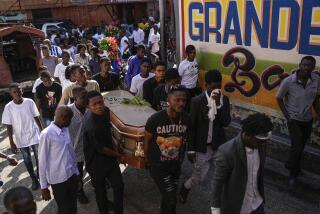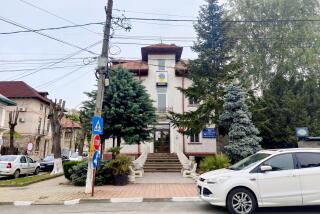Romanian Trip Ends in Relief and Sadness : Revolution: A Fullerton man who buried his brother after a mission of mercy returns with a tale of horror.
- Share via
FULLERTON — Constantine Antimie knew the moment he crossed into his native Romania late last month that things were different: the border agent, without the customary frisking or luggage search, greeted him and his brother with a friendly “Welcome to Romania!”
The moment proved a false harbinger.
Within hours, the two Antimie brothers from Fullerton were attacked three times by armed assailants in the revolution-torn nation.
The third time proved deadly. Constantine’s brother, 21-year-old John, was shot eight times, killed in a hail of gunfire from about a dozen state security police who were apparently suspicious of any foreign cars, the brother said.
The secret police, still struggling at the time to hold onto the country days after the fall of their leader, dictator Nicolae Ceaucescu, fired without warning from a field as the West German rental car sped past, he said.
Constantine himself eventually escaped the attack with only slight wounds. And after burying his brother, he returned late Thursday night to the United States to some 40 tearful family members and friends. With him, he brought a bullet-riddled jacket, graphic photos and details of his brother’s death, and tales of a determined nation in the throes of change.
It was to have been an uplifting return to Romania--to see old friends, including John’s 16-year-old fiancee; to take their sister back to America, and, foremost, to bring $19,000 to their hometown to help build a church and bribe Communist leaders not to tear it down.
The church money was part of the tithe that both brothers had set aside each month, earned through a family contracting business that they started after coming to the United States in 1985 with their father and most of their 10 siblings.
To be sure, there was a sense of some triumph among the throng who greeted Constantine at Los Angeles International Airport--triumph over the fall of Ceaucescu and triumph over Constantine’s safe return.
“I thank God that I am again in America,” he said moments after hugging his three young children and wife for the first time in a month. “I was too close to death . . . to think that I would be able to see my family again.
“It’s a miracle to be alive today.”
Once reunited with his family, Constantine could think only of his brother as he shared the horrifying photographs that he took at the death scene.
The pictures show his brother’s bloodied, bullet-punctured body laying limp in the passenger seat of their rented Audi, as well as uniformed men milling about. The car was hit some 500 times in all, Constantine said. Small pools of blood surrounded it.
As he sat in his Fullerton home, Constantine leafed through the pictures in seeming disbelief and filled in details from his own recollection.
The two brothers had left for Romania last month to aid in the building of the church in their hometown of Marginea, armed with the $19,000 in cash. They had made their plans secretly after hearing from friends in Romania that the Communist government had torn down the church in their hometown.
Undeterred, the townspeople were rebuilding.
But the brothers’ plans were sidetracked by the revolution in Romania. They heard about the fall of Ceaucescu and the outbreak of violence while in France waiting to go to Romania and, changing their plans, used much of the money to buy food and medical supplies to bring with them, Constantine said.
And so they crossed into Romania from Yugoslavia, supplies in tow. Warned about armed Ceaucescu forces who were still terrorizing the country, they picked a southern route to Marginea that they thought would be safe. They were wrong.
Trouble came quickly. Near the town of Resita, the brothers spotted in the woods along the roadside two armed civilians whom they thought to be hijackers. Eight to ten shots were fired, Constantine said, but the brothers escaped unharmed.
The second attack came near the town of Hateg when armed bandits apparently not connected to Ceaucescu robbed them of some of their medical supplies. But again they escaped unharmed with the aid of local townspeople; upon hearing the brothers were fellow Christians, the townspeople escorted them in safety for about 12 miles toward their destination.
Back on their own, the men had to stop to get directions because the road signs had been taken down. John warned Constantine at the time to be careful because they were entering a dangerous area.
Moments later, a few hundred miles from their destination of Marginea along the back roads, the shots came--without warning, from nowhere, it seemed.
From the nearby fields came hundreds of rounds of gunfire, piercing the passenger’s side of the car and windshield, Constantine said.
He heard his brother breathing heavily as he stopped the car. He looked, and John was dead. Constantine opened his door and rolled out into the fields, away from the uniformed attackers who were running toward the car. He hid for a while beside a tree, but they spotted him.
The men searched the car, tossing luggage and contents about the road and using a bayonet to open a briefcase. Under gunpoint, Constantine pleaded with them not to kill him: “I have three children!” he recalled saying.
But it was only with the intervention of a civilian passer-by, Constantine believes, that he survived. The stranger, pointing to Constantine’s knowledge of the language, told the assailants that he was not a foreigner and urged his release.
Constantine said the men then left the scene, taking John’s body with them. At the local mortuary, Constantine later retrieved the body of his brother--identified by workers there as a “terrorist”--and brought it back to Marginea for burial before about 3,000 townspeople.
Work continued on the church as planned. Constantine said he spent $6,000 or so from what was left of his money on 25,000 square feet of hardwood floors for the church and wall linings. There was no need for the bribes because Ceaucescu was gone.
“Everything was changed,” he said. “Now, the religion is the most important thing. Now, it is a country under God.”
The work on the church was mostly done by the time he left Romania earlier this week, Constantine said. But it did not seem the same without John working at his side.
“It was so shocking, so difficult--I cannot find the words in English,” he said.
Back in the United States, there was no funeral, no body. But several hundred family members and friends made do with a memorial service, remembering the slain man as a hero. And family members on Friday were given fresh images of John in photographs--both the smiling young man who waited to enter Romania a few weeks ago, and the bloodied body slumped in the car, a casualty of the revolution.
Still, said the victim’s father, Ion, “It doesn’t seem real.”
More to Read
Sign up for Essential California
The most important California stories and recommendations in your inbox every morning.
You may occasionally receive promotional content from the Los Angeles Times.













